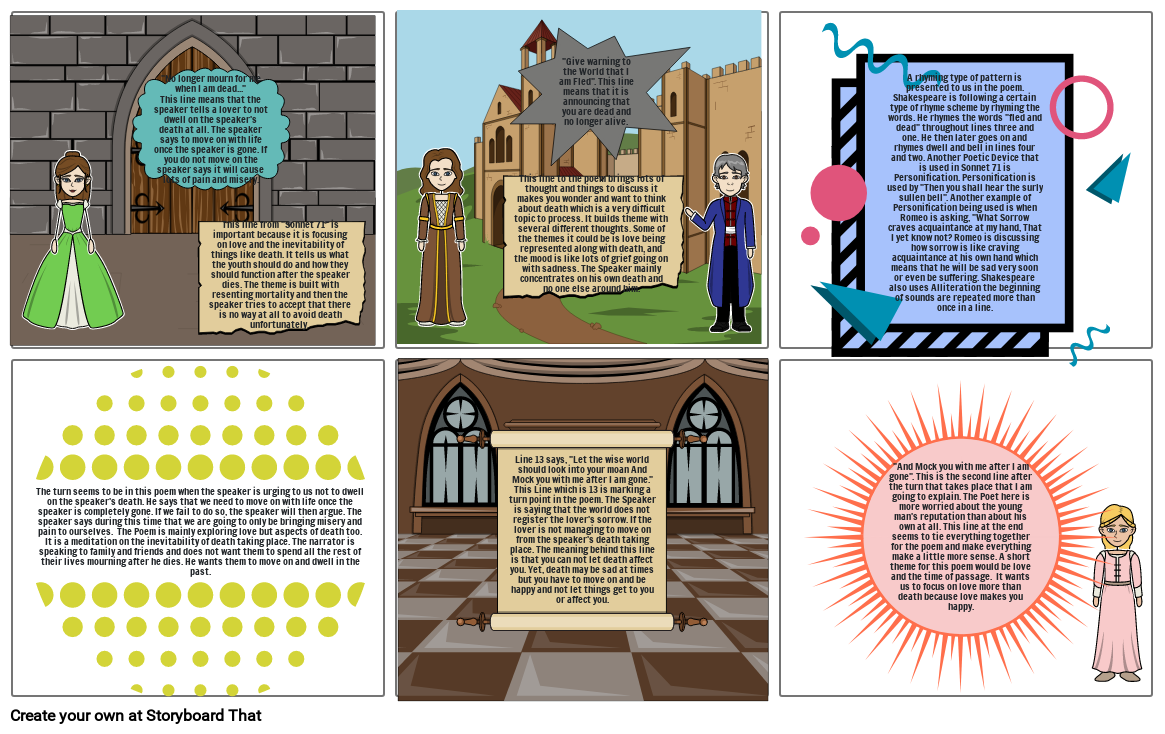Unit Three Lesson 3 Portfolio

Storyboard Szöveg
- "No longer mourn for me when I am dead..."This line means that the speaker tells a lover to not dwell on the speaker's death at all. The speaker says to move on with life once the speaker is gone. If you do not move on the speaker says it will cause lots of pain and misery.
- This line from "Sonnet 71" is important because it is focusing on love and the inevitability of things like death. It tells us what the youth should do and how they should function after the speaker dies. The theme is built with resenting mortality and then the speaker tries to accept that there is no way at all to avoid death unfortunately. 
- This line to the poem brings lots of thought and things to discuss it makes you wonder and want to think about death which is a very difficult topic to process. It builds theme with several different thoughts. Some of the themes it could be is love being represented along with death, and the mood is like lots of grief going on with sadness. The Speaker mainly concentrates on his own death and no one else around him.
- "Give warning to the World that I am Fled". This line means that it is announcing that you are dead and no longer alive.
- A rhyming type of pattern is presented to us in the poem. Shakespeare is following a certain type of rhyme scheme by rhyming the words. He rhymes the words "fled and dead" throughout lines three and one. He then later goes on and rhymes dwell and bell in lines four and two. Another Poetic Device that is used in Sonnet 71 is Personification. Personification is used by "Then you shall hear the surly sullen bell". Another example of Personification being used is when Romeo is asking, "What Sorrow craves acquaintance at my hand, That I yet know not? Romeo is discussing how sorrow is like craving acquaintance at his own hand which means that he will be sad very soon or even be suffering. Shakespeare also uses Alliteration the beginning of sounds are repeated more than once in a line.
- The turn seems to be in this poem when the speaker is urging to us not to dwell on the speaker's death. He says that we need to move on with life once the speaker is completely gone. If we fail to do so, the speaker will then argue. The speaker says during this time that we are going to only be bringing misery and pain to ourselves.  The Poem is mainly exploring love but aspects of death too. It is a meditation on the inevitability of death taking place. The narrator is speaking to family and friends and does not want them to spend all the rest of their lives mourning after he dies. He wants them to move on and dwell in the past.
- Line 13 says, "Let the wise world should look into your moan And Mock you with me after I am gone." This Line which is 13 is marking a turn point in the poem. The Speaker is saying that the world does not register the lover's sorrow. If the lover is not managing to move on from the speaker's death taking place. The meaning behind this line is that you can not let death affect you. Yet, death may be sad at times but you have to move on and be happy and not let things get to you or affect you.
- "And Mock you with me after I am gone". This is the second line after the turn that takes place that I am going to explain. The Poet here is more worried about the young man's reputation than about his own at all. This line at the end seems to tie everything together for the poem and make everything make a little more sense. A short theme for this poem would be love and the time of passage.  It wants us to focus on love more than death because love makes you happy.
Több mint 30 millió storyboard készült
Nincs Letöltés, Nincs Hitelkártya és Nincs Szükség Bejelentkezésre a Kipróbáláshoz!

